

About Environmental Sciences
Environmental sciences concentrates on understanding the major environmental issues facing human societies and adopts a cross-disciplinary approach to their study. UBC's program provides a significant background in physical sciences, earth and ocean sciences, and life sciences. Seminars and student projects are designed to help students perfect their communication skills and ability to work in groups. All environmental science students are required to do a major project in their final year, and engage in a team project in collaboration with a community partner organization. Honours students take an individual research project with a faculty supervisor. The program is housed in UBC's modern Earth Sciences Building--and affiliated with 10 research facilities, a geological field school, a weather-instrument platform, a natural sciences museum, and three industry-facing research groups focused on critical minerals.
Program Details
The program are designed to give students a broad perspective on the environment. Topics include global climate change, human energy use and sources, loss of biodiversity, and environment policy. This program provides a significant background in physical sciences, earth and ocean sciences and life sciences. The core courses examine environmental issues through seminars and student projects. Students select electives from areas of concentration.
Skills
- Gain a systematic understanding of environmental issues
- Field sampling
- Data analysis and modeling
- Analysis of contaminants and pollutants
- Observation and interpretation of data experimental design
- Environmental impact assessments and audits
- Technical report writing
- Technical knowledge using geographic information systems (GIS), statistics, and computer programming
Specializations offered
- Major or Honours, Environmental Sciences


